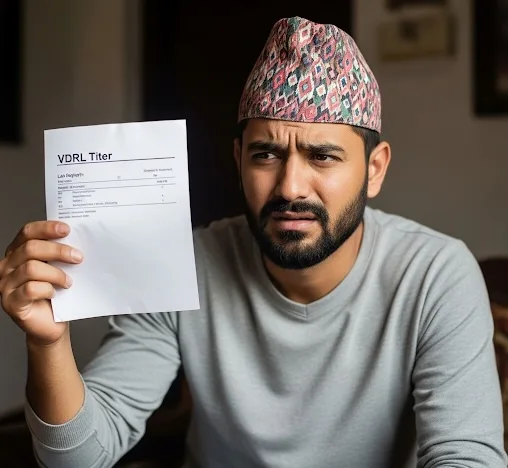Navigating the world of medical tests can be confusing, especially when it comes to sensitive topics like sexually transmitted diseases (STDs). If you or your doctor has mentioned a VDRL test, you might have a lot of questions. What is it? What do the results mean? And what on earth is a ‘titer’?
At Derma Clinic Kathmandu, we believe in empowering our patients with knowledge. Your health is our priority, and understanding your test results is a crucial first step. This guide will demystify the VDRL test, explain what a titer means, and clarify what your results could indicate.
What is the VDRL Test?
The VDRL (Venereal Disease Research Laboratory) test is a blood test used to screen for syphilis. It doesn’t directly detect the bacteria that causes syphilis, Treponema pallidum. Instead, it detects antibodies your body produces in response to antigens, which are substances produced by cells damaged by the bacteria.
It’s important to know that the VDRL test is a non-treponemal test, meaning it’s a screening tool. A ‘reactive’ or positive result suggests a possible infection but always requires a follow-up, more specific test (a treponemal test like TP-PA or FTA-ABS) to confirm the diagnosis.
What is the RPR Test?
You might also hear about the RPR (Rapid Plasma Reagin) test. The RPR test is very similar to the VDRL test. It is also a non-treponemal screening test for syphilis that detects the same antibodies. The primary difference is in how the test is performed in the laboratory. For patients, the RPR and VDRL tests serve the same purpose: to screen for a potential syphilis infection.
The Big Question: What Does a ‘Titer’ Mean?
This is where many people get confused. The term ‘titer’ sounds complex, but the concept is quite simple. A titer measures the concentration of antibodies in your blood.
Imagine you have a glass of dark-colored juice. This is your blood sample. To find out how concentrated the juice is, you start adding water (a diluent) and see at what point you can no longer detect the color.
- A 1:1 titer means antibodies were detected in the undiluted sample.
- A 1:2 titer means antibodies were still detectable after the sample was diluted to one part sample and one part diluent.
- A 1:8 titer means antibodies were detectable even after being diluted eight times.
- A 1:32 titer means they were detectable after a 32-fold dilution.
- A 1:64 titer means they were detectable after a 64-fold dilution.
- A 1:128 titer means they were detectable after a 128-fold dilution.
- A 1:256 titer means they were detectable after a 256-fold dilution.
Essentially, the higher the second number in the titer (1:X), the greater the concentration of antibodies in your blood, suggesting a more active infection.
Learn about Syphilis Symptoms in Details
Why is the VDRL Test Performed?
A VDRL test may be ordered for several reasons:
- Routine Screening: As part of a regular health check-up or pre-employment medical exam.
- Pregnancy: It is a standard part of antenatal care to prevent passing the infection to the baby (congenital syphilis).
- Suspected Infection: If you have symptoms of syphilis, such as a painless sore (chancre), rash, or fever.
- Screening for Other STDs: If you are being treated for another STD, your doctor may screen for syphilis as well.
- Monitoring Treatment: To check if the treatment for syphilis has been effective.
Explaining VDRL Titer Results: What Do They Mean?
Your VDRL result will typically come back as “Non-reactive” or “Reactive” with a specific titer. Here’s a breakdown:
- Non-reactive: This is a negative result. It usually means you do not have syphilis. However, if the exposure was very recent, the test might be negative because your body hasn’t produced enough antibodies yet.
- Reactive (Low Titer – e.g., 1:1,1:2,1:4): A low titer can mean a few different things:
- A Very Early Infection: Your body is just beginning to produce antibodies.
- A Successfully Treated Past Infection: After successful treatment, the titer drops significantly. However, a low-level, stable titer can remain for life. This is called a “serofast” state and usually does not require re-treatment.
- A False Positive: The VDRL test can sometimes react to other conditions like autoimmune diseases, certain viral infections (like mononucleosis or hepatitis), or even recent vaccinations. This is why a confirmatory test is essential.
- Reactive (High Titer – e.g., 1:8,1:16,1:32 or higher): A higher titer is a strong indicator of an active syphilis infection. A titer of 1:8 or greater, especially when accompanied by symptoms or a history of exposure, almost always requires treatment.
Cost of VDRL Testing for Syphilis
VDRL Test Cost Rs500 and VDRL in Titer Costs Rs 800. Also Price of TPHA is Rs 800 and TPHA in Titer is Rs 1000.
STD Testing Price in Nepal
When to Treat and When to Monitor
The decision to treat is based on the titer, confirmatory test results, your symptoms, and your medical history.
- TREAT: Generally, a confirmed reactive VDRL test with a high titer (≥1:8) indicates an active infection that needs immediate treatment with antibiotics, typically penicillin. If you are diagnosed with primary, secondary, or early latent syphilis, treatment is crucial to cure the infection and prevent long-term complications affecting the brain, nerves, and heart.
- CONFIRM & EVALUATE: A reactive result with a low titer requires a confirmatory treponemal test. If the confirmatory test is positive, your venereologist will evaluate whether it’s a new infection needing treatment or a “serofast” state from a past, treated infection.
- MONITOR: If you are in a serofast state (a persistent low titer after adequate treatment), your doctor will likely monitor your titers over time (e.g., at 6, 12, and 24 months) to ensure they remain low and stable. A four-fold increase in the titer (e.g., from 1:2 to 1:8) would suggest re-infection or treatment failure and would require re-treatment.
Understand Syphilis in Nepali
Confidential STD Testing and Expert Care at Derma Clinic Kathmandu
Receiving a reactive VDRL result can be stressful, but you are not alone. The most important step is to seek expert medical advice without delay.
Derma Clinic Kathmandu offers the best, most confidential STD testing, treatment, and consultation with an expert Venereologist in Kathmandu. Our clinic provides a safe, private, and non-judgmental environment where you can discuss your concerns openly.
Our specialists are highly experienced in:
- Accurate Diagnosis: Utilizing both screening (VDRL/RPR) and confirmatory tests for precise results.
- Personalized Treatment: Creating effective treatment plans based on the latest medical guidelines.
- Compassionate Consultation: Helping you understand your health status and guiding you through every step of the treatment and monitoring process.
Don’t let uncertainty affect your peace of mind. If you have concerns about syphilis or any other STD, contact us today Via Phone ,email or Whatsapp to schedule a confidential appointment at 9801358600 .


